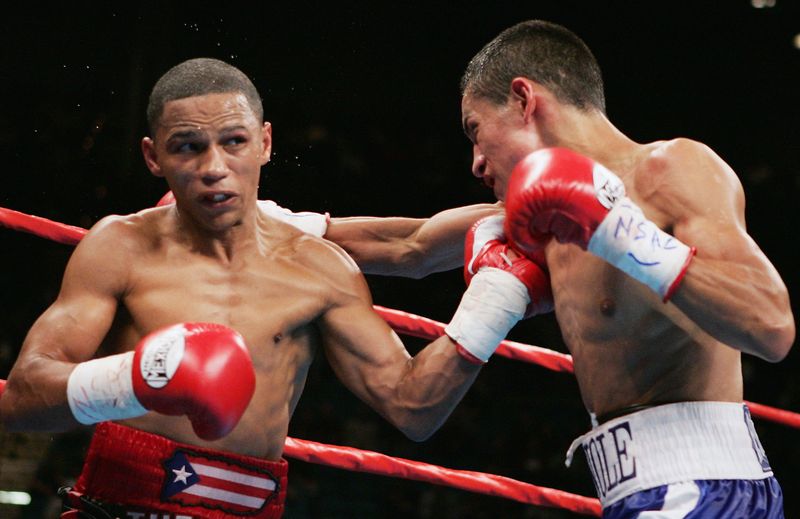
By Badlefthook..com
Five new names have been added to the IBHOF ballot this year.
As ESPN’s Dan Rafael notes, only three fighters will be elected of the 32 finalists in the “modern” category (a fighter’s last bout can have taken place no earlier than 1989), meaning that as usual, plenty of notable names will be left out.
The full list of names on the ballot: Yuri Arbachakov, Paulie Ayala, Nigel Benn, Ivan Calderon, Sot Chitalada, Donald Curry, Chris Eubank, Leo Gamez, Ricky Hatton, Genaro Hernandez, Julian Jackson, Vitali Klitschko, Santos Laciar, Rocky Lockridge, Miguel “Happy” Lora, James “Buddy” McGirt, Henry Maske, Dariusz Michalczewski, Sung-Kil Moon, Michael Moorer, Erik Morales, Orzubek “Gussie” Nazarov, Sven Ottke, Vinny Pazienza, Gilberto Roman, Gianfranco Rosi, Samuel Serrano, Meldrick Taylor, Fernando Vargas, Wilfredo Vazquez, Ratanapol Sor Vorapin, and Ronald “Winky” Wright.
Let’s take a look at the five new names added this year.
Ivan Calderon
/cdn.vox-cdn.com/uploads/chorus_asset/file/9413869/51797892.jpg) Photo by Al Bello/Getty Images
Photo by Al Bello/Getty ImagesCalderon, 42, won world titles at 105 and 108 pounds, and for a pretty long time during his peak years was one of the elite pound-for-pound fighters in boxing, often ranked behind only Floyd Mayweather.
The Puerto Rican, nicknamed “Iron Boy,” turned pro in 2001 and won his first world title in 2003, defeating Eduardo Ray Marquez for the WBO 105-pound title. He made 11 successful defenses into 2007, before he moved up that year to beat Hugo Fidel Cazares for the WBO 108-pound belt. He made another five successful defenses, plus a sixth bout that ended in a technical draw, before losing to Giovani Segura in 2010, and again in a rematch in 2011.
His fall was similar to what we’ve seen this year with Roman “Chocolatito” Gonzalez. The two men didn’t have similar styles at all. Calderon was a pure boxer, didn’t have much power at all, as slick as they get. But eventually, he found himself overpowered at a weight higher than his prime division, against a guy who was maybe not “as good” of a fighter, but was simply a terrible style matchup. Segura, like Srisaket Sor Rungivsai, was a real banger, and both of his wins over Calderon came by knockout, the first in the eighth round, the second in the third on a body shot.
Calderon fought two more times after the losses to Segura, moving back down in weight to try and revitalize his career. It didn’t happen. He beat a club fighter named Felipe Rivas in October 2011, before taking a crack at the WBO 105-pound title again in October 2012, where he was stopped in the fifth round by Moises Fuentes.
Calderon’s final career record was 35-3-1 (6 KO).
Ricky Hatton
/cdn.vox-cdn.com/uploads/chorus_asset/file/9413901/53021616.jpg) Photo by John Gichigi/Getty Images
Photo by John Gichigi/Getty ImagesOne of the great fan favorites of his era, Manchester’s “Hitman” Hatton turned pro in September 1997, and over time mauled and brawled his way to world titles at 140 and 147 pounds.
Hatton, 39, was never a pretty fighter to watch, never one of immense skill or “class,” but he was good in a fight, winning his first major title in 2000, beating Jon Thaxton on points to claim the British junior welterweight title. He then won the WBU title at 140 pounds, the WBU an organization that had hopes of becoming a major sanctioning body but never got there.
Hatton proudly defended that title for years, before finally, in 2005, getting a shot at IBF champion Kostya Tszyu, who was part of the IBHOF Class of 2011. Hatton outworked the aging Tszyu and stopped him after 11 rounds, in what wound up being Tszyu’s last fight. It was the best win of Hatton’s career.
Hatton unified with the WBA title in his next fight, beating Carlos Maussa with a ninth round knockout, before moving up in weight, where he won a controversial decision over Luis Collazo to lift the WBA welterweight title in May 2006.
With Hatton not performing quite like himself at 147, he went back to 140 and dominated Juan Urango and Jose Luis Castillo in 2007, before the biggest fight of his career that December, a trip to Las Vegas and a move back up to welterweight to face the sport’s top dog, Floyd Mayweather.
Hatton gave a game effort, and the traveling UK fans made it a memorable night and incredible atmosphere, but he was pretty well routed by Mayweather, who finished Hatton in the 10th round. Another move back to 140 saw Hatton rack up wins over Juan Lazcano (where Hatton fulfilled a dream of fighting at City of Manchester Stadium) and Paulie Malignaggi, before he ran into the left hand of Manny Pacquiao in May 2009, brutally knocked out at the end of the second round. It was Hatton’s only career loss at 140 pounds.
Three and a half years after the loss to Pacquiao, Hatton made a comeback at welterweight, facing Vyacheslav Senchenko in Manchester. Hatton led on the score cards going into the ninth round, but was knocked out on a body shot.
Detractors may point to the fact that Hatton was never truly an elite level fighter, but he fought at least three Hall of Famers (Tszyu is in, and Mayweather and Pacquiao will be for sure), had a great run at 140, and was one of the biggest stars in boxing during his active years in the sport. In a world where Arturo Gatti is in the IBHOF — and this is no shot at Gatti — Ricky Hatton deserves real consideration, too. Both men made big marks on the sport during their time.
Hatton’s final career record was 45-3 (32 KO).
Vitali Klitschko
/cdn.vox-cdn.com/uploads/chorus_asset/file/9413945/151583018.jpg) Photo by Lars Baron/Bongarts/Getty Images
Photo by Lars Baron/Bongarts/Getty ImagesNow the Mayor of Kiev, Ukraine, “Dr. Ironfist” was long one of the most quietly intimidating men on the planet, a methodical, stoic figure whose expression seemingly never changed.
Klitschko, 46, really had two careers in pro boxing. The first began in late 1996, and saw him become European champion in 1998, before winning his first world title by knocking out Herbie Hide in the second round in June 1999, capturing the WBO belt. Klitschko defended that title twice before an upset loss to American Chris Byrd in April 2000, in a fight he was leading handily before being forced to retire from the bout due to a shoulder injury.
He regained the European title upon his return seven months later, then won four more fights to set up a big 2003 showdown with WBC champion Lennox Lewis. In one of the more famous fights of this millennium in boxing, Klitschko led on all three scorecards after six rounds, with each judging having him ahead 58-56, but the fight was stopped due to a gruesome cut, and Lewis retained. Despite negotiations for a rematch, it never happened. Ultimately, Lewis retired from the sport without fighting again, and Vitali never got another shot against him.
Klitschko won the vacant WBC title in April 2004, stopping South Africa’s Corrie Sanders in the eighth round, which also served as some form of family revenge, as Sanders had knocked out Vitali’s younger brother Wladimir 13 months earlier.
Vitali would defend the WBC title once, dominating Danny Williams (who was briefly a name thanks to his win over the rapidly rotting husk of Mike Tyson), before retiring in November 2005 due to injuries.
After just under four years out of the sport, Vitali returned to action with an immediate WBC title shot against Samuel Peter in October 2008. He smashed Peter for eight rounds before the fight was stopped, then went on to defend against Juan Carlos Gomez, Chris Arreola, Kevin Johnson, Albert Sosnowski, Shannon Briggs, Odlanier Solis, Tomasz Adamek, Dereck Chisora, and Manuel Charr, barely losing any rounds along the way.
From 2008-12, the Klitschko brothers ruled the division with no real competition. The brothers were popular, particularly at home and in Germany, where they fought the vast majority of their bouts, but they always had to battle criticism that they were ruling a weak division, too, that their success was perhaps less about their own ability than the fact that the rest of the field was lousy.
Still, they did dominate, and they were big drawing cards and big names for the sport. Vitali retired in 2013 with a career record of 45-2 (41 KO).
Erik Morales
/cdn.vox-cdn.com/uploads/chorus_asset/file/9414015/847120.jpg)
A personal favorite of mine, so I’ll try to avoid going on and on about how much of an impact he had on me as a boxing fan, how he’s one of the men I consider to be vital to my boxing fandom, and all that.
Morales, 41, turned pro in 1993 in Tijuana, and racked up 16 straight wins before making his way to the United States for the first time in 1995. A super bantamweight who brought action and had skills, Morales got his first world title shot in 1997, where he knocked out Daniel Zaragoza in the 11th round to win the WBC title, which he would defend eight times, before he unified with the WBO title in February 2000.
That was a huge fight, and one that officially kickstarted one of the great rivalries of all-time between Morales and Marco Antonio Barrera. Morales won a razor thin split decision in Las Vegas that night, which wound up being his final fight at 122 pounds.
“El Terrible” moved up to featherweight after, beating Kevin Kelley for the interim WBC title in September 2000, before taking the full title from Guty Espadas Jr in February 2001. After a defense against In-Jin Chi that July, he rematched Barrera in June 2002, with Barrera pulling out the decision win in the rematch.
Morales would get the belt right back five months later, beating Paulie Ayala for the vacant title, defending twice before a move up to 130. He beat Espadas again in an eliminator, then won the WBC belt from Jesus Chavez in 2004, unifying it briefly with the IBF title with a victory over Carlos Hernandez.
Yet again, in yet another weight class, it came down to Morales and Barrera. In their third and final fight in November 2004, Barrera won another close one, this time by majority decision. Perhaps the greatest round of their entire trilogy was the 11th round of the third bout.
After the third Barrera fight, Morales was up and down. He defeated Manny Pacquiao in March 2015, but then was immediately upset by Zahir Raheem at 135 before his second and third bouts with Pacquiao, both stoppage losses, one in the 10th round of a competitive fight, and the other in the third round, when Pacquiao simply overwhelmed Morales in November 2006.
Morales moved up to 135 pounds for real in 2007, and lost to David Diaz in a WBC title fight. He announced his retirement after that fight, which seemed like the right time, but he returned to boxing two and a half years later as a welterweight, beating Jose Alfaro and Willie Limond, working his way back down to 140 pounds late in 2010 for a victory over Francisco Lorenzo, which set up an interim WBA title shot at Marcos Maidana.
In what was really the last great Erik Morales type performance, he hung in tough against a naturally bigger, hard punching Maidana, who was heavily favored to wipe Morales out. In fact, pretty much all media outlets had dumped on the fight going in, including yours truly and this site, and then we got a 12-round war, which Maidana won by majority decision.
Morales did get to win a world title in a fourth weight class, though, as the WBC went out of their way to put their vacant 140-pound title on the line in September 2011 between Morales and an unproven young fighter, Pablo Cesar Cano. Cano was tough, but Morales stopped him after 10 rounds.
From there, time totally caught up with Morales. He missed weight against Danny Garcia and was beaten in March 2012, and their unnecessary rematch seven months later saw Morales knocked out in the fourth round in his final fight, which probably shouldn’t have even taken place, as Morales had tested positive for clenbuterol ahead of the bout.
Morales retired with a career record of 52-9 (36 KO).
Winky Wright
/cdn.vox-cdn.com/uploads/chorus_asset/file/9414081/51770872.jpg) Photo by Al Bello/Getty Images
Photo by Al Bello/Getty ImagesPerhaps the hardest sell of all these fighters, at least for right now, will be the case of Ronald “Winky” Wright, who turns 46 next month.
Wright began his pro career in October 1990, and he never got the chance to work on Easy Street. Major promoters didn’t want to promote him, and starting in 1993, he took his career abroad, fighting in Luxembourg, Germany, Monaco, and particularly in France in 1993 and 1994, eventually landing a WBA junior middleweight title shot against Julio Cesar Vasquez in France in August 1994.
Wright lost that fight, though rather controversially. He dominated much of the fight, but was knocked down five times, one of which many felt was a slip. Scores for the fight were 115-110, 114-110, and 113-110.
Wright bounced back and kept fighting around the world, making a trip to Argentina in his next outing, before returning to France for five more wins in 1995.
Here and there, Wright would fight in the United States, and went to Monroe, Michigan, in May 1996, where he beat hometown hero Bronco McKart to win the WBO junior middleweight title by split decision. He took the title to the United Kingdom for three successful defenses in 1996-97, before a controversial loss in South Africa to Namibia’s Harry Simon in 1998.
His next title opportunity was another controversial loss, this time to the popular Fernando Vargas in an IBF title fight on HBO in 1999. Wright battled around the United States, fighting anyone who would actually get in the ring with him. By this point, Wright had developed a reputation as a very tough, very talented boxer, who had the disadvantages of being good and unmarketable.
He was given a shot at the vacant IBF title in 2001, after Felix Trinidad had vacated, and Wright beat Robert Frazier to win the belt. Oscar De La Hoya was reportedly open to fighting Wright, but the money offered was rejected by Wright.
In 2004, Shane Mosley stepped up to the plate and took the challenge of facing Wright in Las Vegas. Wright clearly defeated Mosley that March, and beat him again in November. A move to middleweight followed, and Wright more or less embarrassed Felix Trinidad, causing Trinidad to announce his retirement two days after the one-sided decision loss.
Wright beat Sam Soliman next, then got a shot at Jermain Taylor and the WBC and WBO middleweight titles in 2006. The two fought to a draw. Wright beat Ike Quartey that December, then moved up in the summer of 2007 for a 170-pound catchweight fight with RING light heavyweight champion Bernard Hopkins. Hopkins won the battle of the crafty technicians.
From there, Wright’s career pretty much ended. Once an avoided man, he was noted for popping up as a “potential opponent” for many name fighters, only for any possible negotiations to fall apart when Wright wanted more money than was available. It’s kind of hard to blame a guy who had Wright’s background for wanting big money, though — he made his own name, outside of the norms of American boxing, and wanted what he felt he’d earned.
He fought again in 2009, and was routed by Paul Williams, then came back in 2012 and was dominated by Peter Quillin. Wright’s final career record was 51-6-1 (25 KO).
Who would you vote for out of the full field? Voters can put up to five names on their ballot, but only three will be elected.

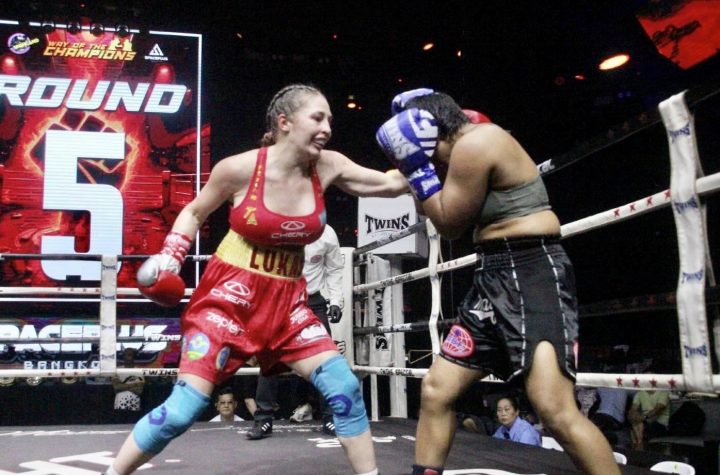
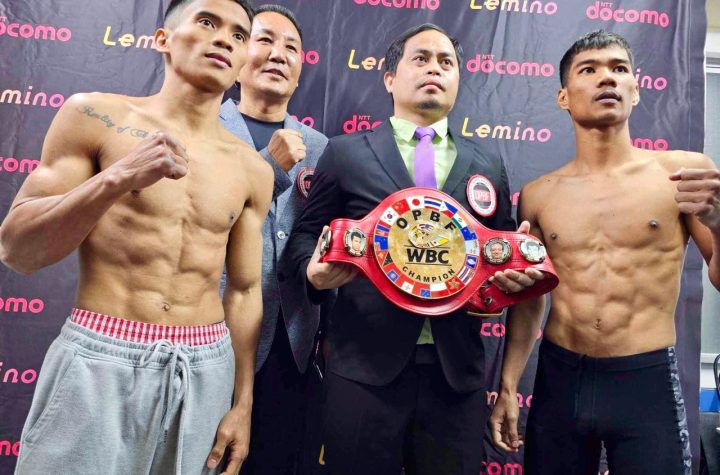
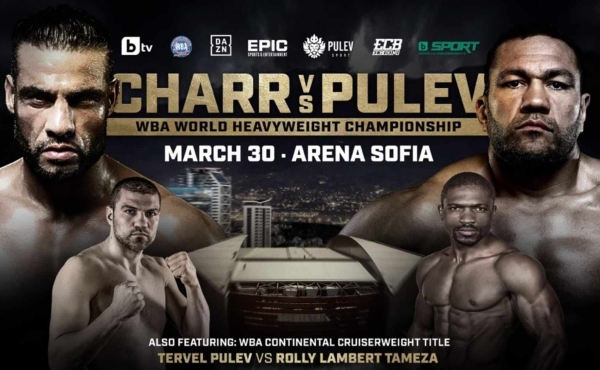
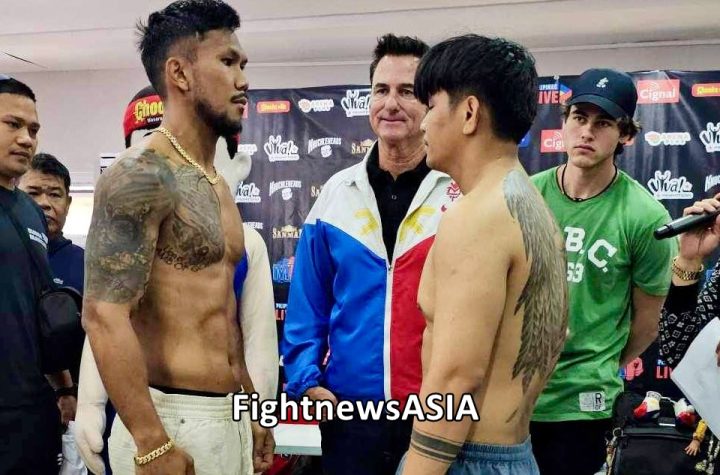
More News
Marcial vs Sinam in Manila
Era, Lukas, Innes Win in Thailand
Vitor vs Kim in Bohol